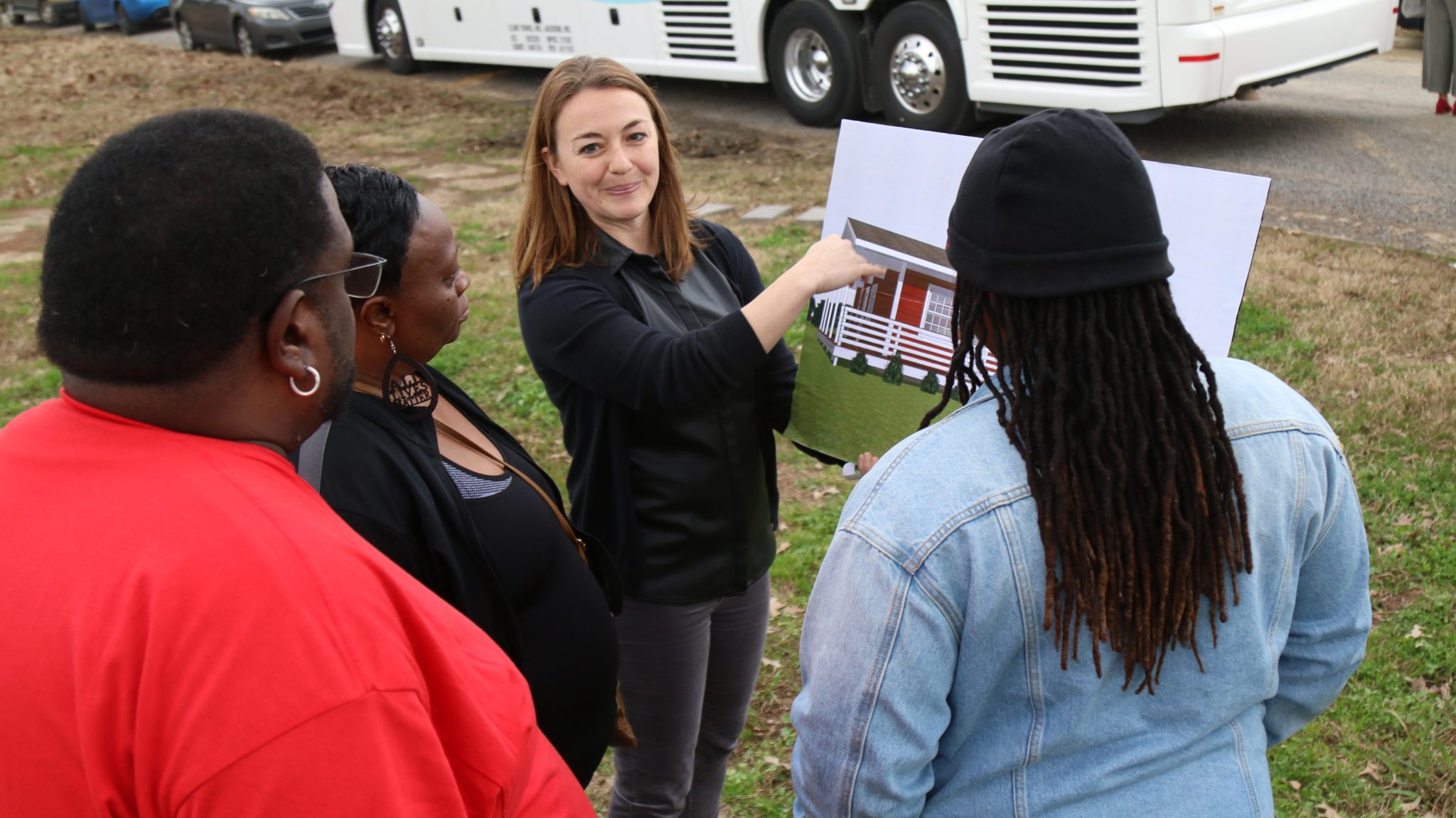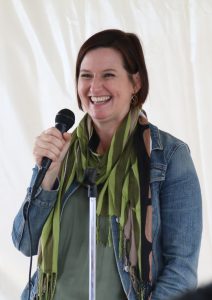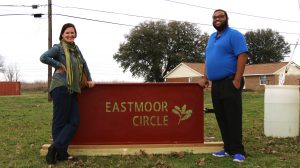
Residents of Eastmoor Circle get a glimpse of what their renovated homes will look like when work is finished. Faculty members and students from the UM Housing Clinic represented the residents in their legal battle against a private landowner and local governments. Photo by Christina Steube/UM School of Law
OXFORD, Miss. – For some communities, empty slabs and plots of dirt can mean devastation. For the neighborhood of Eastmoor Circle, just outside of Moorhead, it means progress.
Ten years ago, the residents of Eastmoor were living in unbearable conditions. The drainage system in the neighborhood did not work properly, causing homes to flood with rainwater and raw sewage. Every few houses in the small, 68-home community were burned-out, abandoned structures overgrown with trees and weeds.
Foundations were crumbling. The streets were impassable to the extent that mail couldn’t even be delivered to residents. The private owner of the homes would take money from tenants but offer no repairs.
“I just started working at the law school, and I heard that there was this neighborhood outside of Moorhead that was in a terrible situation,” said Desiree Hensley, associate professor at the University of Mississippi School of Law and director of its Housing Clinic. “A few people from the neighborhood, people who are still living there today, called and invited us to come and see if there was something we could do.”
What Hensley saw was exactly what she had been told. She was determined to do something about it.
The Housing Clinic assists families and individuals with serious legal problems in their living situations that do not have the resources to hire attorneys and address these needs.
The community is in Sunflower County, but some services, including utilities, were provided by the city of Moorhead. At the time, determining who was responsible for maintaining the neighborhood was the biggest issue, along with the landlord providing safe housing for tenants.
Eastmoor was in desperate need of a legal remedy.
After about a year of investigating, Hensley tried negotiating solutions to some of these problems.
“With the sewer issue came concerns about the safety and quality of the water,” she said. “Once you have raw sewage, you have a concern about the water that’s being pumped into homes. After spending a year trying to work those things out, we were unable to, and we sued.”
Hensley and the Housing Clinic filed a lawsuit on behalf of the neighborhood against the city of Moorhead, Sunflower County and the private landowner.
“Once you decide to represent an entire neighborhood and that neighborhood invites you to help them, it’s a lot of work,” Hensley said.
Marie Cope, assistant clinical professor at the law school and director of the Transactional Law Clinic, set aside her normal duties to help Hensley litigate this case. The clinics exist at the School of Law not only to help the community, but also to give law students practical experience as student attorneys.

Desiree Hensley, UM associate professor of law and director of the Housing Clinic, speaks at the Hope Summit in February at the Eastmoor Circle neighborhood of Sunflower County. Hensley represented the residents of Eastmoor Circle in a lawsuit that served as the catalyst for rebuilding the community. Photo by Christina Steube/UM School of Law
Hensley estimates that at least 150 students worked on the case and helped individual residents.
“Law students need to represent places like Eastmoor so they see that lawyers have really important work to do to make this world a better place,” Hensley said.
After about four years of litigation, the case was settled.
“The main reason the residents settled the case is the leadership of the city of Moorhead,” Hensley said. “The city decided to apply for and get a grant to repair and replace the sewer system, and the county agreed to repair and improve the roads and to take title to that.”
The private owner also deeded the houses to the individuals living in them, allowing them to own their homes.
“There were a lot of good things that came out of that settlement, but what was agonizing was even though the homeowners got deeds to their houses, their houses were in terrible condition,” Hensley said. “Sadly, as important as our litigation was in providing solutions, it would still leave the homeowners in a really desperate situation in terms of the quality of their homes.”
That’s when more “Hope” arrived.
Hope Enterprise Corp., a credit union enterprise, frequently assists small communities along the Mississippi River Delta in Tennessee, Arkansas, Mississippi and Louisiana. The organization secured $3 million from Goldman Sachs to not only remove the abandoned homes, but to rehabilitate the 44 existing homes for the residents and provide a playground for children in the community.
Last month, Hope hosted a summit in the Mississippi Delta. The event included visits to Hope project sites, including Eastmoor Circle, as well as a conference featuring Jerome Powell, chair of the United States Federal Reserve.
“It’s most important for the people who live here, but when I heard that Hope was coming in to try to help this community achieve its goals following the settlement of the lawsuit, it was a day that changed my life,” Hensley said. “It was a day that I didn’t think could ever really happen.
“I hated to leave these people in homes that were in terrible condition through no fault of their own. There should have been safe and decent housing.”
Hensley said she is thankful that Hope is not only bringing new homes to the community, but also is taking care of the residents who have endured these conditions for so long.
“There’s really no state or federal pocket of money to help people who already who have title to their homes, and there are limited financial mechanisms for people to get affordable loans on decent terms,” she said.
“We don’t want to leave behind the people who have been here 30 and 40 years, so I really appreciate that Hope came up with a creative strategy, not just to bring new residents to the neighborhood, but also to embrace the people who stuck through this, through thick and thin.”
Johnny Carter moved to Eastmoor in 2003 and tried to get help for the neighborhood consistently over the years before the Housing Clinic arrived, even taking matters into his own hands on some days. He would go around the neighborhood and clean up as much as he could.
“It looked like something out of an old, scary movie,” Carter said. “There are a lot of memories in this neighborhood, but it was just in such bad shape. As time went on, we got help. Now, things look so much better.”
Derrell Wright, Moorhead councilman, lived in Eastmoor for 29 years before moving within the city limits, but has always wanted the community that shaped him to improve.
“This place has a sentimental value to me, and the condition it was in to where it is now is completely different,” Wright said. “It’s uplifting to see so many houses being revamped, and from a city standpoint, we love it.”

Desiree Hensley (left) and Ole Miss law student Brandon Wilson visit Eastmoor Circle during the HOPE Summit in February. After the settlement of the lawsuit by the UM Law Housing Clinic, Hope has worked to renovate the neighborhood. Photo by Christina Steube/UM School of Law
Earlier this month, Hope hosted a tour of the Eastmoor project, along with several others, in hopes of securing resources for further development. Although city and county leaders were defendants in the litigation, several attended the event to show their support for the community and gratitude for an agreed solution.
“I wasn’t too happy to meet Desiree back then, but she turned out to be OK and it all worked out for the good,” Moorhead Mayor George Holland joked. “A lot of kids live down here and to see them living in such a deplorable condition; nobody wanted to see that.
“We’re grateful to see Eastmoor as what it is today. We might have to be a poor community, but we choose to be clean community.”
Progress continues in the community. Heavy equipment is actively clearing lots and building new homes on a daily basis, but other projects, such as the installation of working street lights and completion of the playground, are still needs faced by the community.
Though the case has long been settled, the Housing and Transactional clinics still work on legal issues for Eastmoor residents every semester. From will drafting to clearing title issues, the law school continues to engage students in the lives of the Eastmoor community.
“We litigated this case, but we did it in partnership with the residents, and we could not have done it without them,” Hensley said. “I’m so glad they have not been left behind by these changes and that their community, neighborhood and lives are becoming everything that they told me they wanted them to be.”
For more information about clinical programs at the School of Law, visit https://law.olemiss.edu/.